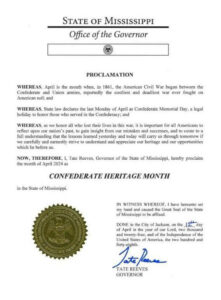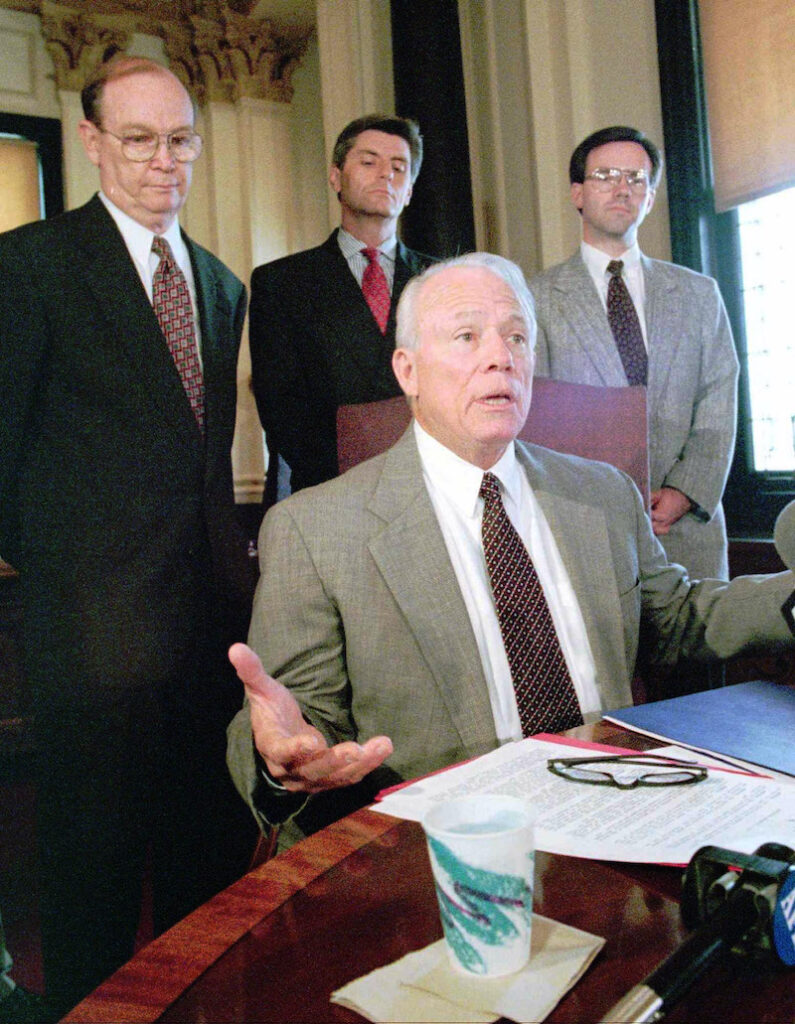Mississippi Gov. Tate Reeves declared April 2024 as Confederate Heritage Month in Mississippi, keeping alive a 31-year-old tradition that began in 1993. Beauvoir, the Biloxi, Miss., the museum and historic home of Confederate President Jefferson Davis, announced the proclamation in a Facebook post on Friday, April 12.
“Whereas, as we honor all who lost their lives in this war, it is important for all Americans to reflect upon our nation’s past, to gain insight from our mistakes and successes, and to come to a full understanding that the lessons learned yesterday and today will carry us through tomorrow if we carefully and earnestly strive to understand and appreciate our heritage and our opportunities which lie before us,” says the governor’s proclamation, which is dated April 12. “Now, therefore, I, Tate Reeves, Governor of the State of Mississippi, hereby proclaim the month of April 2024 as Confederate Heritage Month in the State of Mississippi.”
 Beauvoir is owned and operated by the Sons of Confederate Veterans, a neo-Confederate organization that promotes “Lost Cause” ideology, a revisionist history that whitewashes the Confederacy’s racist past and downplays the role of slavery in the Civil War. Beauvoir annually receives $100,000 from the State of Mississippi for development and maintenance.
Beauvoir is owned and operated by the Sons of Confederate Veterans, a neo-Confederate organization that promotes “Lost Cause” ideology, a revisionist history that whitewashes the Confederacy’s racist past and downplays the role of slavery in the Civil War. Beauvoir annually receives $100,000 from the State of Mississippi for development and maintenance.
Starting in 2016, Donna Ladd, then the editor of the Jackson Free Press and now the executive editor of the Mississippi Free Press, first reported on then-Mississippi Gov. Phil Bryant’s Confederate Heritage Month proclamations. The Mississippi Free Press has reported on Reeves’ annual proclamations as well in 2020, 2021, 2022 and 2023. This year, the Picayune Item broke the story of the proclamation in a report on April 12.
The Confederate Heritage Month proclamations annually appear on SCV Facebook pages, but neither the governor nor any other state official publicizes the proclamations or posts them on any public-facing state websites or social-media pages.
Reeves defended issuing the proclamations in 2021.
“For the last 30 years, five Mississippi governors—Republicans and Democrats alike—have signed a proclamation recognizing the statutory state holiday and identifying April as Confederate Heritage Month,” he said in a statement to WAPT at the time. “Gov. Reeves also signed the proclamation because he believes we can all learn from our history.”
‘Thoroughly Identified With the Institution of Slavery’
After Kirk Fordice became Mississippi’s first Republican governor in a century while courting the white supremacist Council of Conservative Citizens and criticizing efforts to atone for the state’s racist past, he issued the inaugural Confederate Heritage Month proclamation at the request of the Sons of Confederate Veterans in 1993.
Since then, one Democratic governor and three Republican governors have followed Fordice’s lead. In the 30 years since then, only one governor has ever skipped issuing a Confederate Heritage Month proclamation. Despite issuing them for his first seven years in office between 2011 and 2018, former Gov. Bryant did not issue a Confederate Heritage Month proclamation in 2019, his last year in office, opting instead for a “Month of Unity” proclamation on behalf of a Christian organization.

The language in Reeves’ Confederate Heritage Month proclamation uses much of the same language as one that former Democratic Gov. Ronnie Musgrove, who served from 2000 to 2004, issued in April 2000.
Last year, Musgrove told the Mississippi Free Press that Confederate Heritage Month is “something that should not continue in today’s world.”
“I cannot say why the practice started, but it was one that should never have been started,” the former governor said. “It was one that I should not have signed and it should have ended a long time ago.”
Former Republican Gov. Haley Barbour also signed Confederate Heritage Month proclamations every year between 2004 and 2016.
Though Confederate Heritage groups like SCV promote a whitewashed version of the South’s role in the Civil War that has often made its way into textbooks in the state and throughout the country, the historical record makes clear that slavery was the primary cause of the Union’s split and the subsequent Civil War.
“Our position is thoroughly identified with the institution of slavery—the greatest material interest of the world,” Mississippi’s 1861 Declaration of Secession says. “Its labor supplies the product which constitutes by far the largest and most important portions of commerce of the earth.”
Reeves’ ties to the SCV stretch back long before his time as governor. In 2013, he spoke to the SCV’s national gathering in Vicksburg, Miss., in front of a massive Confederate battle flag and in a room decorated with smaller Confederate flags and cotton plants. After then-Lt. Gov. Reeves congratulated the organization for “keeping history for our youth,” speakers defended the Confederate “cause” and compared “Yankees” to German “Nazis” in World War II.

Long before entering politics, Reeves was part of a Millsaps College fraternity known for Confederate-themed parties where members wore blackface and for lionizing Confederate General Robert E. Lee. When it became an issue in his 2019 campaign for governor, though, he said he never participated in blackface during his time in the fraternity.
Reeves’ Democratic opponent at the time, then-Attorney General Jim Hood, was also in a fraternity at the University of Mississippi where members wore blackface; he similarly denied ever participating.
Reeves Denied Existence of ‘Systemic Racism’
In the decades after the Civil War ended, Confederate veterans, such as Mississippi State University inaugural President Stephen D. Lee, and groups like SCV began the work of remaking history in a way that shone a more favorable light on the South—muddying the waters over the cause of the war and falsely describing it as a “war of northern aggression.”
After the Civil War and the failure of Reconstruction, Mississippi’s white leaders worked to enshrine white supremacy in state law, adopting a Jim Crow state constitution in 1890 (its racist felony voter disenfranchisement provision remains in state law and continues to disproportionately disenfranchise Black voters). White supremacist leaders in Mississippi renewed efforts to enshrine Confederate heritage in the 1950s and 1960s in reaction to the rise of the civil rights movement.
Mississippi’s Confederate-themed 1894 state flag flew over state buildings until 2020, when state lawmakers voted to retire and replace it amid a national race reckoning about Black activists’ efforts for decades and in the wake of young Black Mississippians leading protests against racism and the Mississippi flag after the murder of George Floyd. Despite his campaign pledge not to support efforts to retire the flag, Gov. Reeves signed the bill retiring the old flag into law, calling it “a law to turn a page in Mississippi today.”
“It is fashionable in some quarters to say our ancestors were all evil. I reject that notion. I also reject the elitist worldview that these United States are anything but the greatest nation in the history of mankind. I reject the mobs tearing down statues of our history—north and south, Union and Confederate, founding fathers and veterans,” the governor said in 2020, criticizing Black Lives Matter protesters even as he signed the legislation retiring the old state flag. “I reject the chaos and lawlessness, and I am proud it has not happened in our state.”

Despite signing the law that changed the old flag, though, Gov. Reeves continued to deny the lasting effects of the state’s white supremacist history. In 2021, he told Fox News that “there is not systemic racism in America”—contradicting mountains of evidence, including the vestiges of Jim Crow that remain in force in Mississippi law like the State’s racially targeted 1890 voter disenfranchisement law.
Then, in 2022, Reeves signed a so-called “critical race theory ban” into law, which is a misnomer because despite its legislative title, the law neither mentions nor describes critical race theory. As he signed the bill, the governor claimed that “critical race theory is running amok,” despite the fact that the lawmakers who drafted it admitted that they did not know of any public K-12 schools where the academic theory is taught.
He also painted critical race theory, which addresses systemic racial inequalities in the legal system and throughout society, as a tool of indoctrination that is used to “humiliate” white people.
“Children are dragged to the front of the classroom and are coerced to declare themselves as oppressors, that they should feel guilty because of their race, or that they are inherently a victim because of their race,” he said at the time.
The State will also observe Confederate Memorial Day on April 27 as mandated under State law.
For more on the Sons of Confederate Veterans, “redemption” schemes, and the censorship campaign to romanticize and sanitize the Confederacy in southern and U.S. textbooks, read this in-depth piece about first Mississippi State University President Stephen D. Lee’s successful efforts to rewrite the Confederate narrative.
Disclosure: Former Gov. Ronnie Musgrove has donated to the Mississippi Free Press. This does not affect our coverage.










